Now in my re-watch of the original Planet of the Apes franchise I have arrived at my 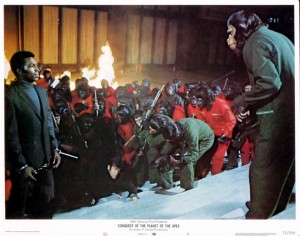 favorite film of the series, Conquest of the Planet of the Apes. While I love me Planet of the Apes and it is wonderful film, more often than any other in the franchise I will pull out the blu-ray of Conquest and sit back to watch it over and over. Once I did get it on Blu-ray I also stopped watching the theatrical cut and exclusively watch the unrated directors edition. When the film was released in 1972 they had hopes of getting a ‘G’ rating, but thee scene of revolution were so intense the studio feared they might get an ‘R’ and ordered the ending re-written and the footage edited to be considerably less graphic.
favorite film of the series, Conquest of the Planet of the Apes. While I love me Planet of the Apes and it is wonderful film, more often than any other in the franchise I will pull out the blu-ray of Conquest and sit back to watch it over and over. Once I did get it on Blu-ray I also stopped watching the theatrical cut and exclusively watch the unrated directors edition. When the film was released in 1972 they had hopes of getting a ‘G’ rating, but thee scene of revolution were so intense the studio feared they might get an ‘R’ and ordered the ending re-written and the footage edited to be considerably less graphic.
Conquest is set twenty years after the end of Escape from the Planet of the Apes. During the twilight years of Bush 41’s presidency (that’s snark because the film is set 1991, now more than twenty years in out past) apes have become a slave population, having 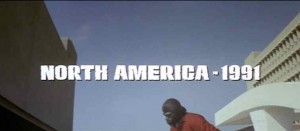 progressed from pets, replacing the cats and dogs that died in a global pandemic into a servant and slaves. Armando, the kind hearted circus owner last seen saving the time-traveling apes’ baby has returned to the city, bring the circus for a need tour, and along with it the now adult intelligent ape Caesar. (Whom was named Milo as a baby in the last film but hey retcon is nothing new.) thing go badly and before long Ceasar is a slave himself, alone and friendless, subject to the same brutal treatment as his ape brothers and sisters, including the producer’s wife in appearance number 3 in the ape movies. In the end Caesar lives up to his new name and leads a revolt overthrowing the fascist power structure in a brutal, bloody, and revenge filled night. The film ends with images of the city burning and nearly all of our principle human characters dead.
progressed from pets, replacing the cats and dogs that died in a global pandemic into a servant and slaves. Armando, the kind hearted circus owner last seen saving the time-traveling apes’ baby has returned to the city, bring the circus for a need tour, and along with it the now adult intelligent ape Caesar. (Whom was named Milo as a baby in the last film but hey retcon is nothing new.) thing go badly and before long Ceasar is a slave himself, alone and friendless, subject to the same brutal treatment as his ape brothers and sisters, including the producer’s wife in appearance number 3 in the ape movies. In the end Caesar lives up to his new name and leads a revolt overthrowing the fascist power structure in a brutal, bloody, and revenge filled night. The film ends with images of the city burning and nearly all of our principle human characters dead.
It is grim, dark, and very deliberate metaphorical statement on violence generating more violence. This is an example of 70’s cinema that I truly enjoy. It is dark, it is grim, it is cynical, but it is also stuffed with ideas. This is a film that using the pretext of science-fiction and adventure tries to talk about the very real troubles and issues plaguing the United States then and today. SF films of the 70s really began to turn to adult themes and ponder serious questions, and even a film such as this one, with limited budget and an eye firmly fixed on the bottom line, did not jettison the idea for the spectacle. Today all too often SF movies are nothing more than extremely big budgeted action films devoid to content and thought. (I’m looking at you Transformers and pretty much anything from Michael Bay.) If you have not seen this film, or it has been many years, get the blu-ray and watched the uncut version. It’s quite a shocker. (next up, shudder, Battle for the Planet of the Apes.)


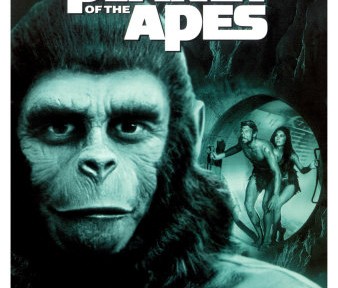
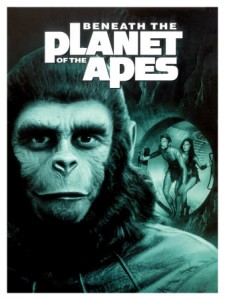 Beneath the Planet of the Apes is the hastily consider sequel to 1968’s smash box-office success Planet of the Apes. However due to financial troubles at 20th Century Fox and boardroom infighting the film suffered from a trouble production from the get-go. Heston, the star of the first film hated the very idea of any sequel and only reluctantly agreed to participate as a favor to Daryl Zanuck, but even this came at the price with Heston insisting that his character of Taylor — spoiler alert stop reading if you care, serious stop reading — be killed off in the story.
Beneath the Planet of the Apes is the hastily consider sequel to 1968’s smash box-office success Planet of the Apes. However due to financial troubles at 20th Century Fox and boardroom infighting the film suffered from a trouble production from the get-go. Heston, the star of the first film hated the very idea of any sequel and only reluctantly agreed to participate as a favor to Daryl Zanuck, but even this came at the price with Heston insisting that his character of Taylor — spoiler alert stop reading if you care, serious stop reading — be killed off in the story.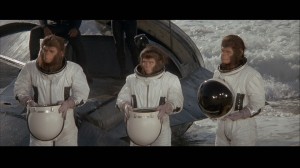 I can clearly remember seeing Escape from the Planet of the Apes at the Sunrise Theater in Fort Pierce Florida. That was 1971 so I would have been 10 years old, and I remember laughing a full belly laugh as the ‘unmasking’ scene at the film’s open. Escape faced the challenge of crafting a continuation of the story when in the pervious film not only did your principle characters get killed, but the entire freakin’ world was turned to ash as a gravely toned narrator informed the audience that the world was now dead.
I can clearly remember seeing Escape from the Planet of the Apes at the Sunrise Theater in Fort Pierce Florida. That was 1971 so I would have been 10 years old, and I remember laughing a full belly laugh as the ‘unmasking’ scene at the film’s open. Escape faced the challenge of crafting a continuation of the story when in the pervious film not only did your principle characters get killed, but the entire freakin’ world was turned to ash as a gravely toned narrator informed the audience that the world was now dead.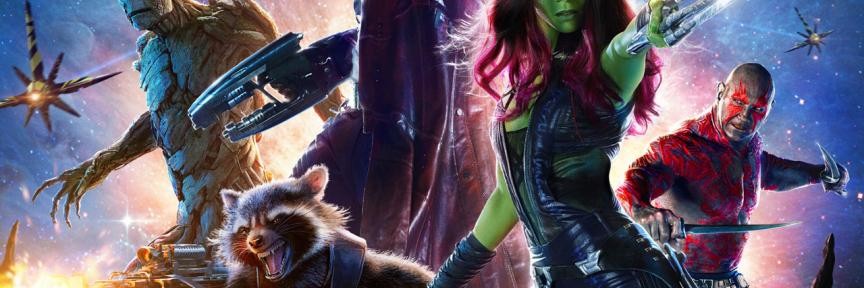
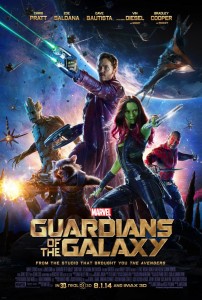 Guardians of the Galaxy (GotG) must count among the strangest concepts ever used to launch a major franchise. GotG concerns a collection of criminals and riff-raff that are thrown together with conflicting motives with the fate of the galaxy resting on their actions.
Guardians of the Galaxy (GotG) must count among the strangest concepts ever used to launch a major franchise. GotG concerns a collection of criminals and riff-raff that are thrown together with conflicting motives with the fate of the galaxy resting on their actions.